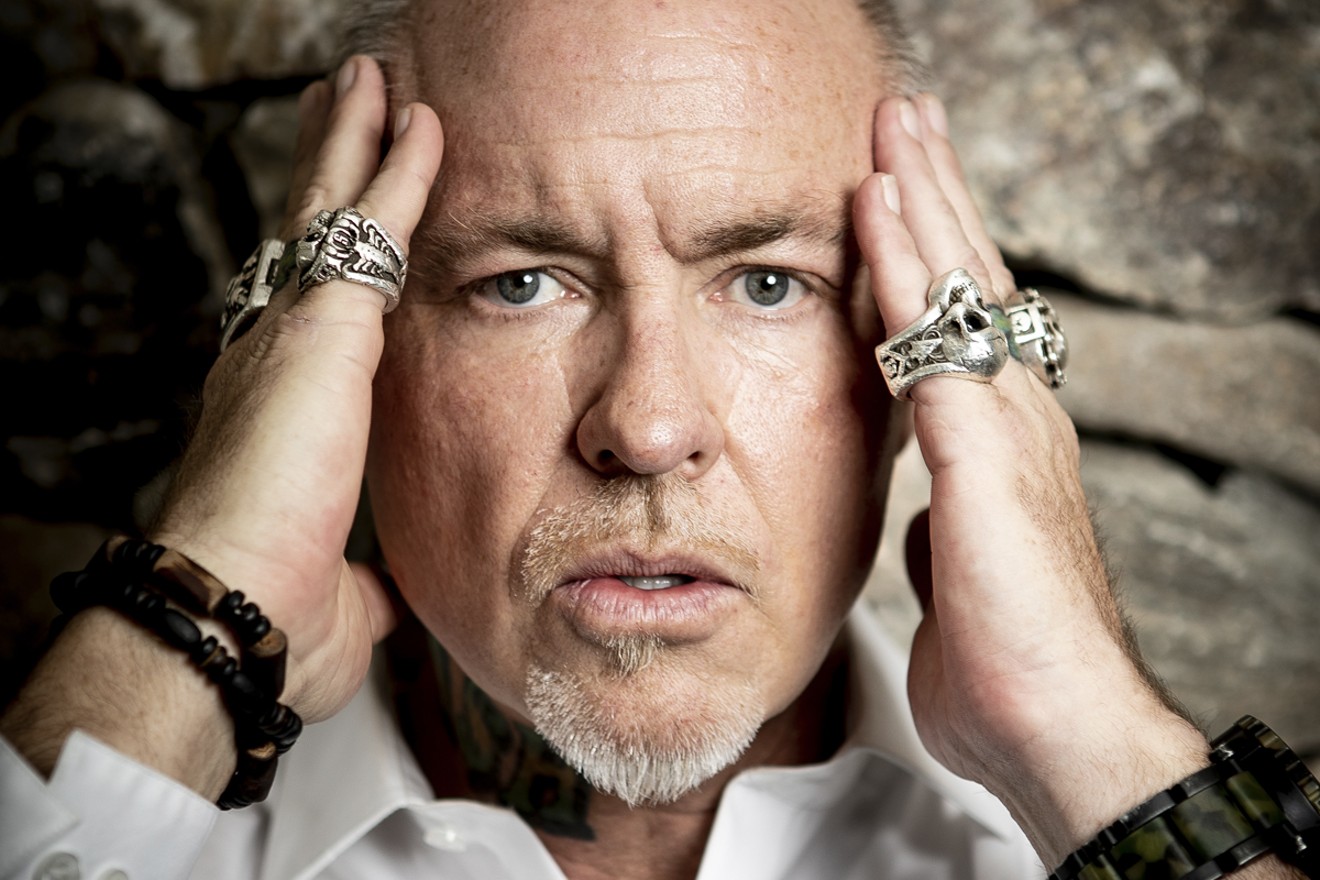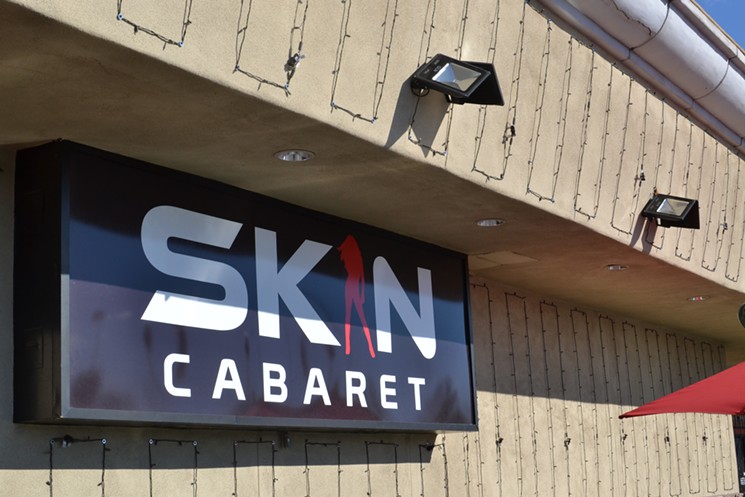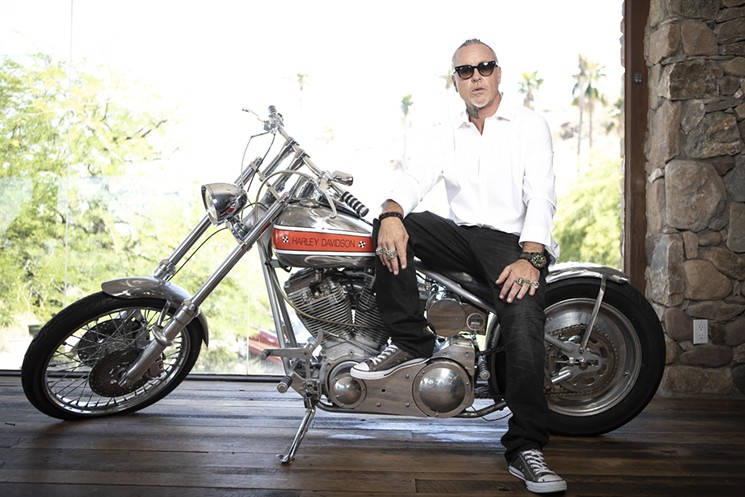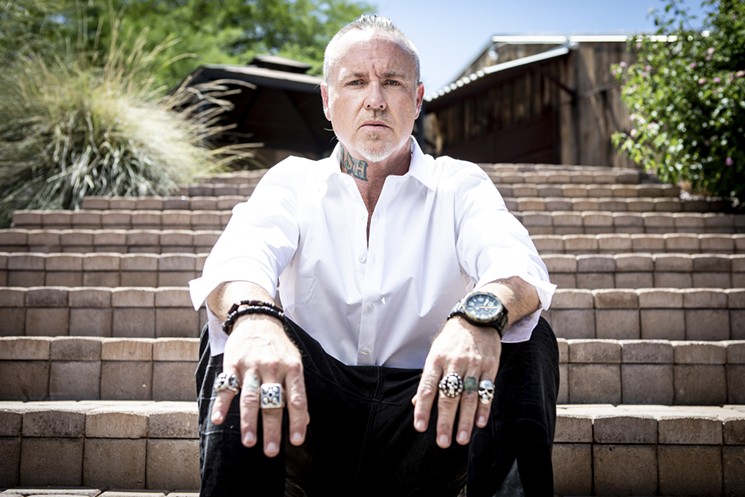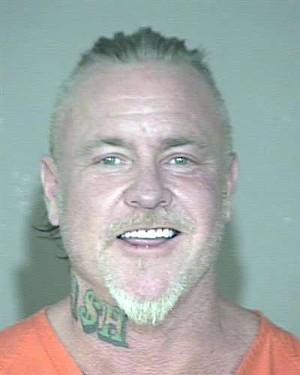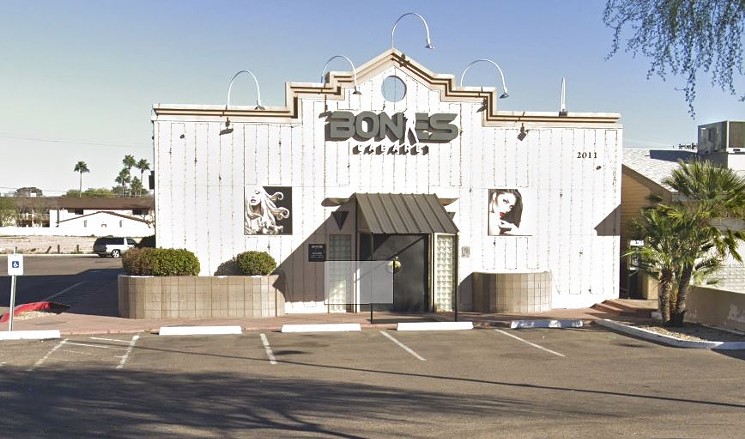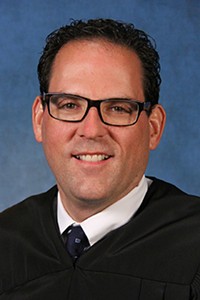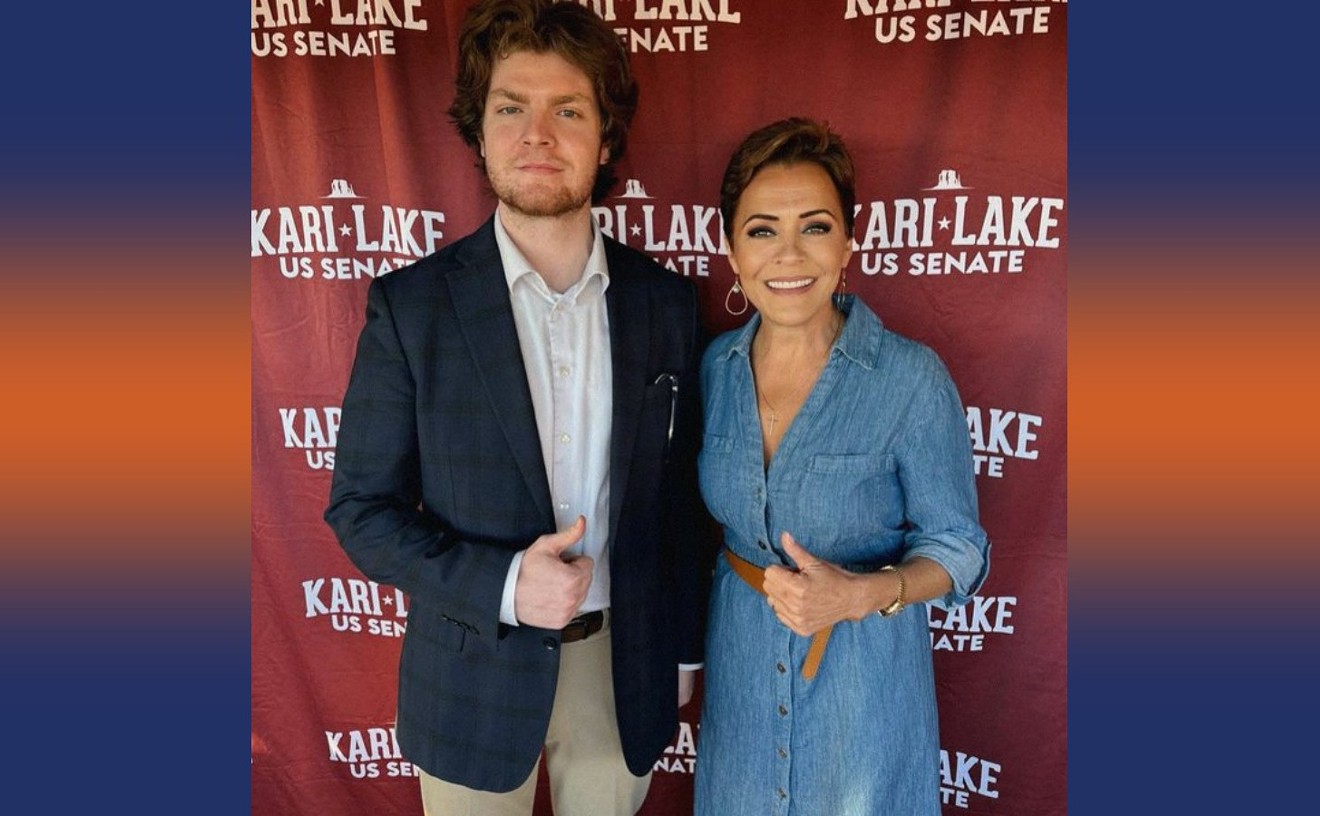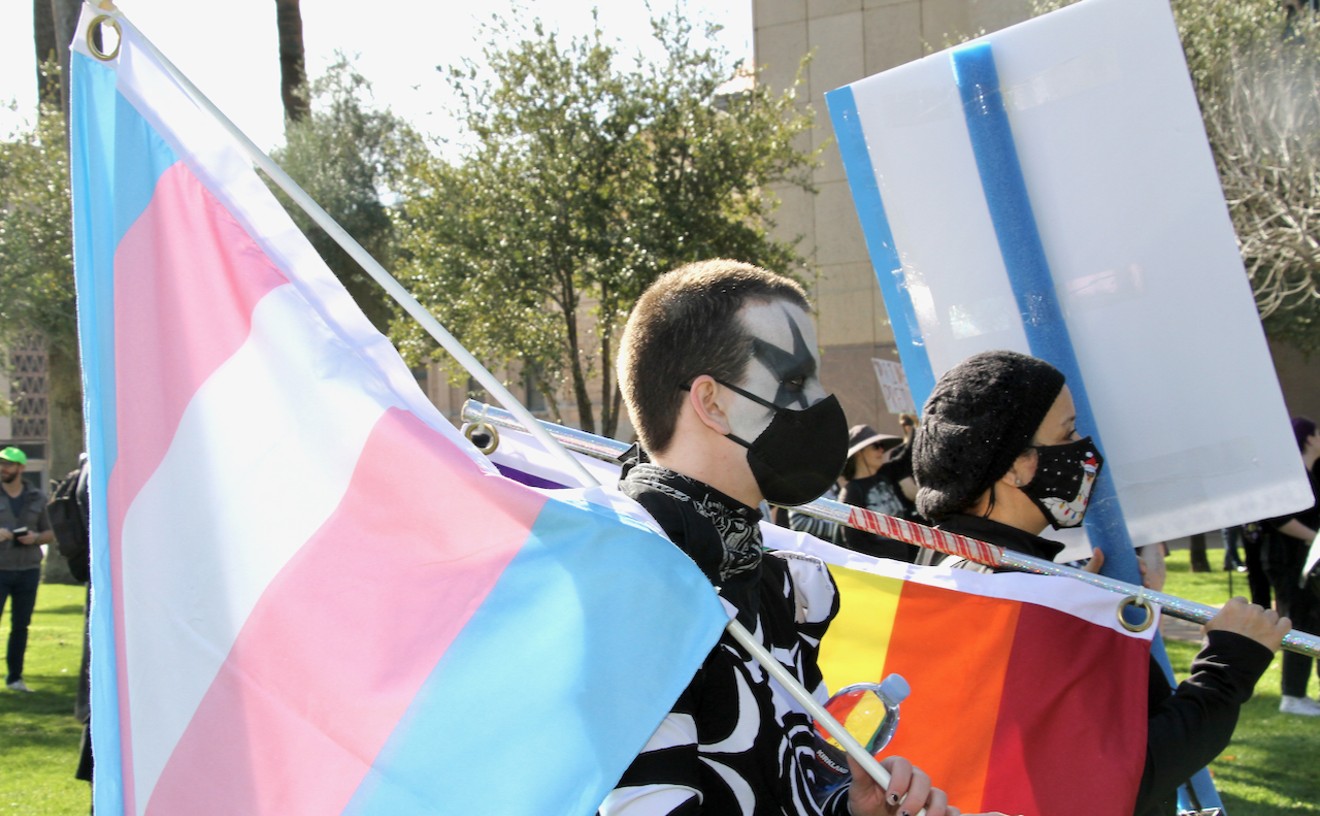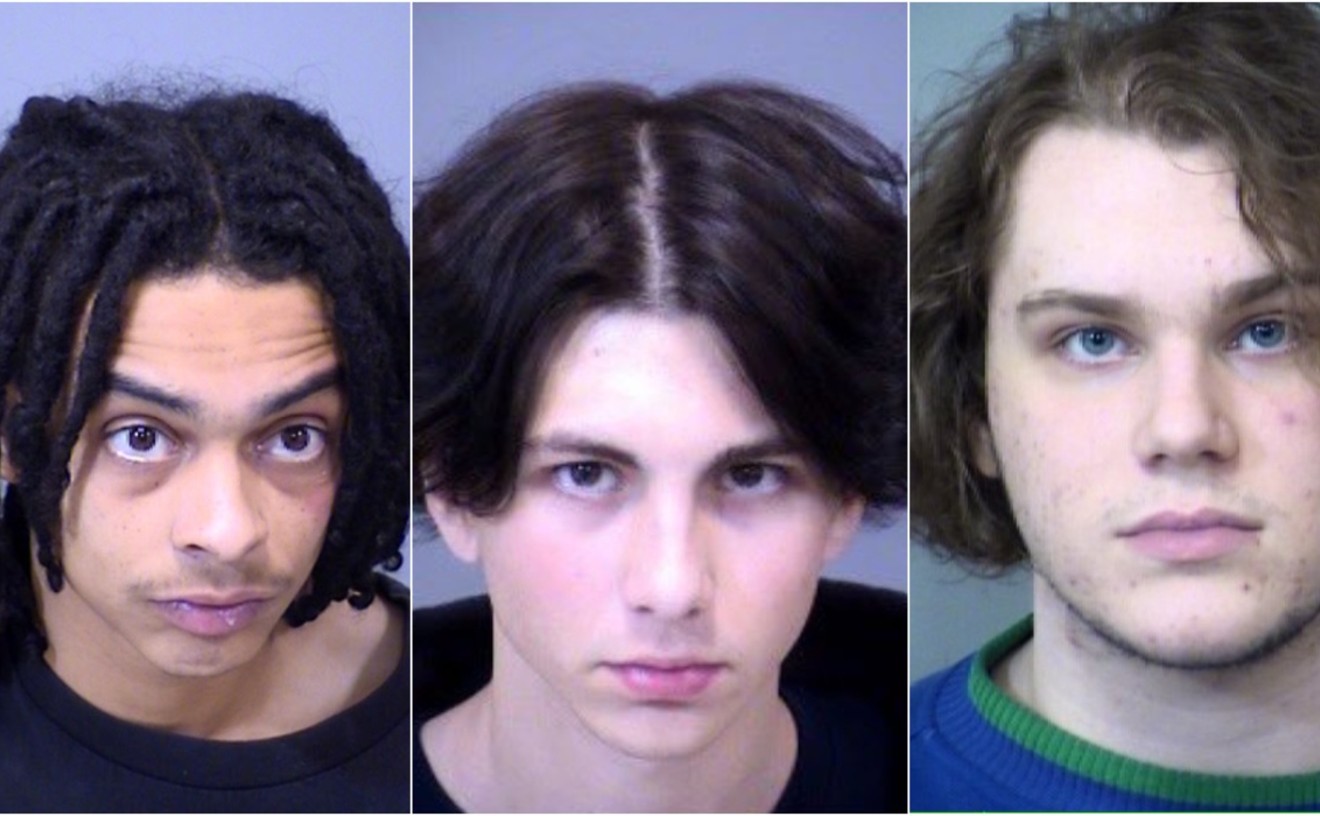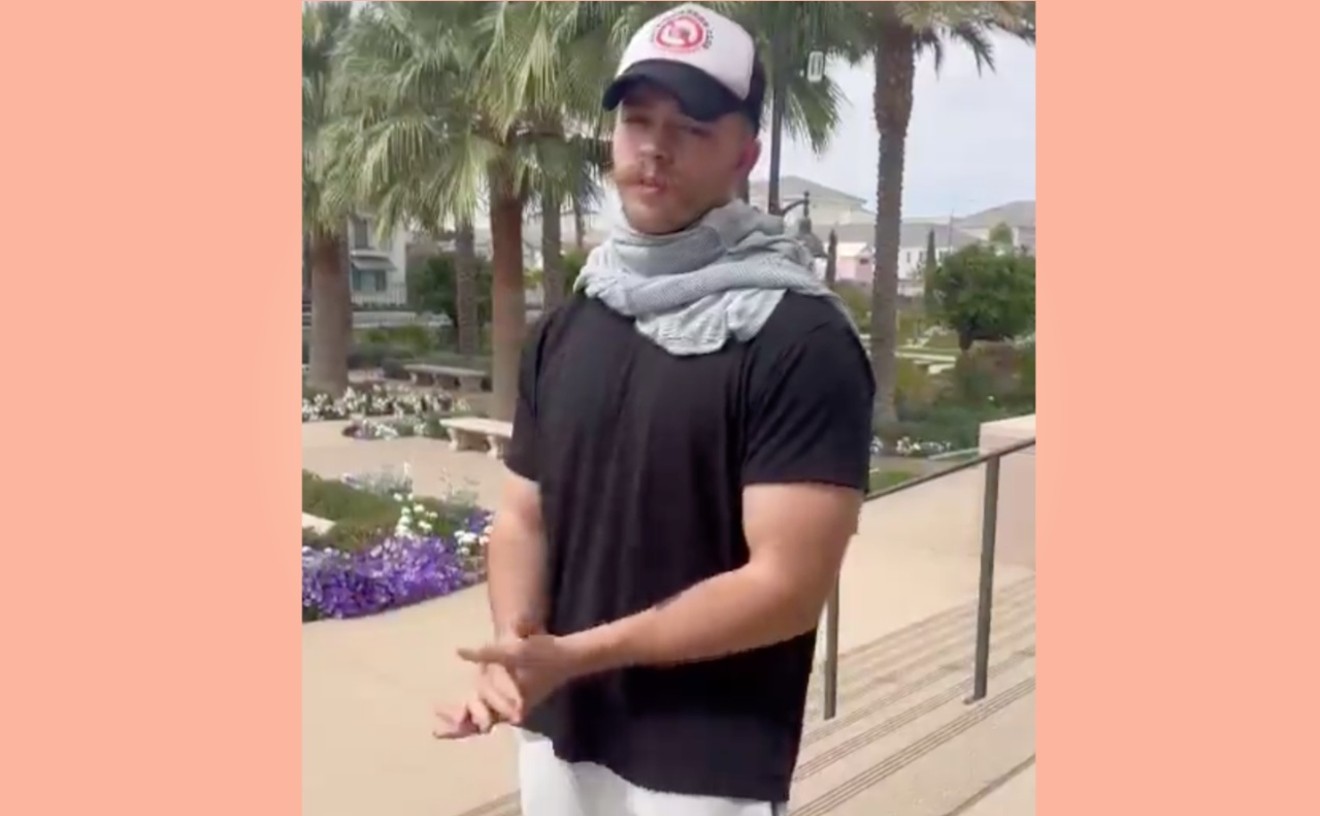Limbs bound, eyes maced, the strip club owner pondered his fate in his laundry room, where burglars had discarded him after beating him up, sticking what felt like a gun to the back of his neck, and threatening to kill his Chihuahuas, Bandit and BeBe.
They had forced Borowsky to surrender the passcode to his safe before making off with $100,000 cash, some firearms, and an unconscionably expensive watch. The burglars promised to return with a human-sized sack and take Borowsky to God knows where, possibly a human-sized hole in the ground.
But they did not return. After enough silence had passed, Borowsky contorted his body upright, opened his laundry room door, and promptly fell back down.
So Borowsky wiggled.
He wiggled along his hardwood floor, past his three vintage motorcycles, his island bar, his Sopranos-themed pinball machine, toward the big glass windows on the east side of his Phoenix home, where before this home invasion on July 12, 2015, he enjoyed sweeping views of Scottsdale and Paradise Valley.
Thankfully, the glass of his residence’s modernist exterior offers two-way transparency. The house sits along a road leading to the Cholla trail of Camelback Mountain, a popular destination for hikers.
One such hiker, an off-duty police officer, heard the strip club owner’s screams and looked up to see the man tied up and hugged against the window of his million-dollar home. The officer entered the house through a sliding back door. He took photos of Borowsky and cut the zip ties constraining his arms and legs with scissors from the kitchen counter. The officer lent Borowsky his phone to call 911 and left the crime scene after cops on the clock arrived.
Borowsky told the responding officers that he failed to get a good look at the men who broke into his home and left with his belongings.
He put out a call for help on Facebook, offering a $10,000 reward to anyone who could offer information on the robbers. Mark Brooks, a pawnbroker who had previously loaned Borowsky money, responded to the post.
Messaging Brooks back might have been the worst decision of Borowsky’s life. He would soon get entangled in a bad loan with Brooks that would lead him to relapse on his sobriety, shoot his AR-15 in the dead of night, spend 51 days in jail, and face the potential of 41 years in prison.
Brooks told Borowsky on Facebook Messenger that he had recently suffered a home invasion himself, prompting him to install a new security system at his estate. Brooks connected Borowsky with the same contractor — OnGuard Security — that installed his alarm.
Two years later, another pair of intruders tripped Borowsky’s new alarm system.
Brooks had hired them.
Freight Train
Todd Borowsky was born in New Jersey on May 5, 1969, to Eric Borowsky, an engineer, and Betty Borowsky, a registered nurse.He has two older sisters: Lisa Borowsky, an attorney and former Republican Scottsdale City Council member, and Kristen Borowsky, a real estate agent.
The youngest Borowsky sibling turned 50 this month.
“I made it, buddy,” he said during an interview at his Phoenix home, recalling that just a few years ago he nearly drank himself to death.
After his childhood and teenage years riding dirt bikes and throwing parties in the desert, Borowsky started a career as a hairstylist at Carsten Salon. He made plans to move to New York.
Those plans began to falter when his father — who had accumulated a small fortune in real estate — bought Arizona Snowbowl in Flagstaff, one of two premier ski resorts in the state, at an auction in 1992 for $4 million.
Borowsky spent a couple of seasons in Flagstaff, where he obtained a real estate license. He then moved back to Scottsdale and became active in the city’s nascent nightlife. He spent time drinking at Planet Earth, one of the first Scottsdale nightclubs. Before long, he started looking for his own place to party.
In 1995, he bought a small taco bar with $10,000 of his hairstyling money and called it Cat Eye Lounge. He DJed at the lounge every night, playing rock and rap, or as he described it: “Slayer to Ice Cube.”
The lounge grew in popularity, attracting wealthy patrons and rock stars, so Borowsky decided to buy a limousine. The car dealer sold him a limo — and a strip club at the corner of Scottsdale Road and Bellevue Street. Borowsky renamed the club Skin Cabaret in 2002.
After years working as the center of attention at his lounge, Borowsky enjoyed the behind-the-scenes nature of his new line of work. Nobody comes to a strip club to see the owner.
From 2005 to 2006, Borowsky stood at the center of a political firestorm over lap dances. The Scottsdale City Council passed an ordinance banning strippers from getting too close to patrons, a prohibition that would have killed Borowsky’s business.
The ordinance, supported by then-Mayor Mary Manross, was passed shortly after adult film star Jenna Jameson purchased a stake in another Scottsdale club called Babe’s, just blocks away from Skin Cabaret. Borowsky helped lead a citizen initiative to overturn the ordinance.
He won. Lap dances remain a lucrative service in Scottsdale.
Sometime in 2011, Borowsky became deeply addicted to alcohol. He made headlines after ramming an SUV with his 1971 Chevy Chevelle before driving away to the Scottsdale Waterfront. A witness described Borowsky “stumbling and staggering” as he walked into the building, Phoenix New Times reported.
Borowsky described himself as the type of alcoholic who dies if he doesn’t drink, one who underwent more than 20 hospitalizations and multiple blood transfusions during his darkest years. “Nothing stopped the freight train,” he said.
The freight train was a lonely place to be. At his worst, Borowsky mostly drank at his home in Phoenix and occasionally at a condominium he owned in San Diego.
One night in 2014, he entered a tattoo shop and walked out with the word “CA$H” emblazoned on his neck. He said the word symbolizes Johnny Cash, the late singer-songwriter who famously struggled with substance abuse.
“I was dying on God’s terms. Not mine,” he said. “I was going out like Cash.”
Borowsky really almost died.
In October 2014, Borowsky drank himself into a nine-day coma. His sister Kristen connected him with an old family friend involved with Alcoholics Anonymous. Borowsky got sober on November 11, 2014.
He bought his second strip club, Bones Cabaret, the next year. The investment set him back, so he turned to an old club regular, Mark Brooks, for a boost.
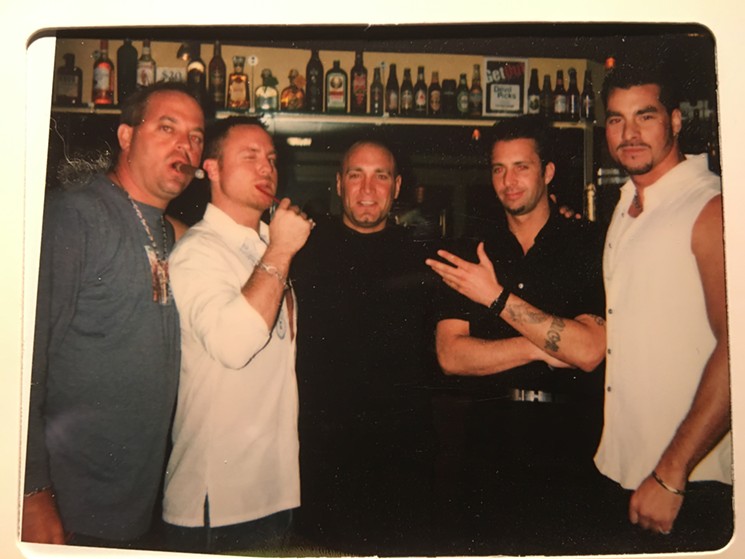
Todd Borowsky stands to the right of Mark Brooks (far-left) at Cat Eye Lounge in a photo dated "two decades ago."
Courtesy of Todd Borowsky
Pawn Man
Brooks has been involved in the pawn business since 1991, the year he opened a shop on North Cave Creek Road.But his career nose-dived in 1997, when he was indicted on 14 felony counts including arson, criminal damage, fraud, forgery, trafficking in stolen property, illegal control of an enterprise, and theft.
He pleaded guilty in 1998 to four felonies, including fraudulent schemes and practices, forgery, and theft, and was sentenced to two years’ probation.
Brooks’ criminal charges stemmed from suspicions that he planned to hire a hitman to kill an ex-girlfriend, the Arizona Republic reported at the time. Brooks was not charged in connection with that accusation.
But the tip to Phoenix police launched a 14-month investigation into the department’s pawnshop unit. Dubbed Operation Red Dog, the probe uncovered evidence that pawnshop cops received favors from Brooks, including special discounts on pawned goods.
In exchange, the cops let Brooks get away with criminal activity. At least 28 police officers were disciplined in connection with the investigation.
Perhaps the most lurid detail to come out of the probe: Brooks threw a bachelor party for a Phoenix officer involving strippers who were paid $1,000 each to perform sex acts on one another as about 30 cops looked on. As the Republic reported it at the time, the officers then climbed into a party bus stocked with booze and outfitted with televisions showing pornography. Four or five cops climbed through the emergency hatch and surfed the bus.
During his criminal case, Brooks created a website that posted the addresses and contact information of officers who cooperated with the investigation of his pawn business, leading some cops to receive threats. His guilty plea forced him to hand the site over to the Maricopa County Attorney’s Office, then headed by Rick Romley.
Brooks’ crimes required him to give up his pawn license for five years and surrender his federal firearm dealing license. According to a subsequent federal investigation, he devised a scheme to stay involved with his businesses without putting his name to paper.
Brooks’ method? Straw owners, according to the ATF.
Shortly before his plea deal, Brooks’ friend Steve Bagdonas created a new pawnshop company called Millennium Banc LTD. Another friend of Brooks, Robert Johnson, was listed as a statutory agent, according to a report filed with the Arizona Corporation Commission. Johnson had been involved in lending, including cash loans for businesspeople who fell on hard times, since 1989.
Brooks transferred ownership of his Cave Creek pawnshop to Millennium Banc. He received a monthly “consultant’s” salary of $7,500, according to federal court documents.
Just three days after Brooks’ guilty plea, Bagdonas applied for a federal firearms license for the pawnshop with the Bureau of Alcohol Tobacco and Firearms — and was approved. The company opened at least two more pawnshops in the Valley, each licensed to sell guns.
In 2004, Brooks and Bagdonas organized a new limited liability corporation, National Lending Group, which, according to federal court documents, claimed to “repossess” the assets of Millennium Banc, including its pawnshops.
To obtain a firearms license for National Lending Group, Bagdonas submitted “renewal” paperwork for Millennium Banc, rather than a new application from the new company. ATF missed the error and approved National Lending Group to sell guns.
Sometime in 2005, the ATF rescinded the firearms license after an investigation of the pawnshops found that Brooks, a convicted felon, was involved in its day-to-day operations. National Lending Group pushed back, taking the feds to court to get its licenses back. It lost.
“The evidence established that Mr. Brooks participated in the daily activities of the business, appearing behind the counter, handling firearms, having the alarm codes, and responding to alarm incidents,” the U.S. Ninth Circuit Court of Appeals ruled in 2010.
Around November 2012, Brooks appeared to venture into a related industry: the auto title loan business. His business partner Johnson set up a company called Auto Title Loans USA, LLC.
In 2014, management of Auto Title Loans USA switched over from Johnson to Brooks’ daughter Alexis Brooks, who at the time was pursuing a degree at the Arizona Summit School of Law. Brooks’ wealthy acquaintance David Hurowitz also signed on as a manager through an LLC he controlled.
Soon after the management transition at Auto Title Loans USA, Borowsky, owner of expensive cars, needed some quick cash.
Debt
Around the time Mark Brooks reconnected with Todd Borowsky after the 2015 home invasion, Borowsky also met David Hurowitz.On November 3 of that year, Hurowitz contacted Borowsky on Facebook, identifying himself and Brooks as “partners in the title loan business.”
Hurowitz offered to run any vehicle identification numbers or license plates through a tracing system that could help Borowsky catch his home invaders. Borowsky never took Hurowitz up on that offer (remember, the burglars threw him in a laundry room), but when he needed some cash, Hurowitz’s name came to mind.
Sometime in spring 2016, Borowsky — remembering Hurowitz’s message — reached out to Brooks about obtaining a new loan. He had just opened a new rock ’n’ roll-themed strip club, Bones Cabaret, crimping his cash flow.
As he explained it to New Times, Borowsky “needed personal cash for a moment” to take care of mortgage payments, insurance, and medical bills.
Borowsky met Brooks at his home on May 10, 2016, thinking he would also be meeting Hurowitz for a loan through Auto Title Loans USA. Hurowitz was not present.
At his home, Brooks spoke on behalf of Hurowitz and business partner Robert Johnson, claiming they were offering a “friends rate” of 3 percent monthly interest on a $100,000 loan, to be given in bundles of cash in a paper bag, according to Borowsky.
For collateral, Borowsky would put up his 2005 Lamborghini Gallardo and 2007 bulletproof GMC Denali, according to a copy of the “installment loan security agreement” obtained by New Times. He had one year to pay off the loan.
Looking at the agreement, several red flags emerge. For one, the agreement listed Brooks as the sole creditor, rather than Auto Title Loans USA. But Borowsky understood that the money belonged to Hurowitz, the listed manager for the company.
Brooks also insisted that all transactions be conducted in cash. Finally, Brooks was reluctant to give receipts.
Borowsky looked past the red flags. “My credit was screwed up,” he explained to New Times. “At that time there was absolutely no other option for me.”
Brooks, rather than Hurowitz, was the listed creditor again when, three months later, Borowsky took out an additional $40,000 in loans secured through his 1971 Chevelle Convertible, which he’d purchased from Mötley Crue bassist Nikki Sixx.
Days after the Chevelle loan, Borowsky put up his Skin Cabaret liquor license for another $50,000 credited by Brooks. According to a civil lawsuit filed later by Borowsky against Brooks, the creditor also put a lien on the liquor license for Bones Cabaret without the strip club owner’s knowledge.
After a year flew by on Borowsky’s first $100,000 loan, he got a yearlong extension to pay it off with an increase from 3 to 4 percent interest. In July 2017, Brooks made a final loan of $10,000 to Borowsky. Altogether, Borowsky’s loans from Brooks added up to $200,000 in cold hard cash, with $8,000 monthly interest payments.
The relationship between creditor and debtor started to sour in fall 2018. The dissolution began, according to the lawsuit later filed by Borowsky, when Brooks started bringing “young girls” to Borowsky’s house that he had met on the website SeekingArrangement.com.
Borowsky said he asked Brooks to stop, but his lender allegedly continued bringing girls over.
As Borowsky’s criminal defense attorney explained during a court hearing months later: “My client did not like the fact that Mark Brooks took advantage of young women. He found it disgusting and posted it on Facebook.”
Borowsky told New Times he has since taken down the Facebook post. The gist of the message was a warning to local parents to keep their daughters away from Brooks.
Borowsky told Brooks he wanted him out of his life. He told Brooks he could take his cars for all he cared.
Brooks’ lawyers disputed Borowsky’s stated reason for their quarrel. “The falling out between Plaintiff and Mr. Brooks was due to Plaintiff’s consistent abuse of alcohol and illegal narcotics and Plaintiff’s resulting state of intoxication,” attorney William Klain wrote in a legal filing.
The two stopped talking. Brooks reached out to someone else to collect Borowsky’s interest: his father, Eric Borowsky, who had access to Todd’s strip club bank accounts.
In October 2017, the elder Borowsky wrote three checks out to Brooks totaling $8,000, according to copies of the checks obtained by New Times. Per Brooks’ instructions, Eric Borowsky made the checks out to cash.
Eric wrote a check in November. Todd says he paid in cash in December. And on January 11, a witness saw Todd Borowsky pay Brooks $8,000 in cash at Brooks’ home.
On January 22, 2018, Todd Borowsky sold a lease interest on a building at 7434 Camelback Road, where he had planned to open a new bar called the Camelback Club. He intended to use the money from the sale, $250,000, to pay off his debts to Brooks.
Borowsky asked one of his attorneys how he should issue the payment of his loan. Baker advised him to set up an appointment at a bank with a third-party notary.
But when Borowsky called Brooks on January 23, 2018, to arrange a meeting for the payoff, the lender did not take well to the suggestion. According to Borowsky, Brooks wanted him to bring the cash to his house instead of getting a check at the bank.
The stress of the situation, Borowsky said, caused him to drink again. Heavily.
On January 27, Borowsky told New Times, Brooks called him and invited himself over to his house. The lender arrived with his girlfriend at the time, MacKenzie Pate.
A minute-long snippet of the evening meeting at Borowsky’s home was surreptitiously captured by Brooks in a cellphone video. Borowsky can be seen shirtless in his kitchen, rambling under the influence of alcohol.
At the end of the minute-long video, Brooks can be heard saying, “Dude, you did awesome on that lease thing. That’s fucking incredible.”
It would later be alleged that Brooks had set up the meeting to take Borowsky’s keys. According to repo men who would later work with Brooks to seize Borowsky’s cars, Pate distracted the strip club owner while the lender grabbed the keys to his Lamborghini and GMC Denali.
Brooks’ attorneys, who also represent Pate, denied that allegation. They claimed Borowsky threw the keys while they were walking away and said, “Get these pieces of shit out of my driveway.”
'Little Rabbits'
The two repo men hired by Brooks to seize Borowsky’s cars showed up on the strip club owner’s driveway on Cholla Lane after 10 p.m. on January 30.Repo men Stephen Randall and Francisco Nuñez brought Borowsky’s keys and a jumper box with them, according to an interview Randall gave to Borowsky’s legal team in March 2019.
Nunez went for the Lamborghini, Randall for the Denali. That’s when they tripped Borowsky’s motion sensors.
Borowsky walked out with a flashlight, Randall said, and confronted the repo men, who told the strip club owner what they were doing.
“He said, ‘Okay, all right, cool, not a problem.’ I swear to God he said that to us,” Randall later told Borowsky’s legal team. “And then his face, it just changed, like, from happy to ghost pissed.”
Borowsky yelled at the repo men. He ran back into his home and hit an emergency button on his alarm system, triggering a 911 call.
Randall and Nunez retreated to their truck and drove down Cholla Lane, back to a parking lot off a major thoroughfare where they rendezvoused with Robert Johnson, Brooks’ business partner, who accompanied the group for moral support.
Borowsky said he received a call from Brooks that he did not pick up. Borowsky instead texted Brooks at 10:39 p.m: “Legally I can not talk to u. Do not contact my family or employees.” He provided an email address for Skin Cabaret that Brooks could contact to arrange a payment.
At least three Phoenix police officers responded to the call on Borowsky’s property at approximately 10:45 p.m., according to reports. In two-and-a-half-minute-long body camera footage of the encounter, time-stamped at just after 11 p.m. that evening, Borowsky appears intoxicated, stumbling around his driveway with a flashlight.
He demands a police report on the spot. The police explain that it takes time to write up a report and that he needs to file a public records request for a copy. Borowsky briefly argues with the officers before saying: “Gentlemen, I’m not going to argue with you. Have a good day.” The video ends.
Around the same time as Borowsky’s first encounter with the police, Brooks was parked up the hill from Borowsky’s house with his girlfriend, MacKenzie Pate. He called Johnson, parked down the hill. Johnson put the call on speakerphone for Randall and Nunez to hear.
According to Randall’s interview with Borowsky’s legal team, Brooks told Johnson to lie to the police.
The proposed lies: that all four men, rather than just Nunez and Randall, confronted Borowsky on his driveway. That Borowsky pulled a handgun from his pants and threatened to kill Brooks.
Sure enough, Johnson approached the cops as they left the neighborhood and relayed Brooks’ version of events, according to a police report written by Officer Jason Bloom. In the same report, Bloom says he advised Johnson not to try the seizure again that evening.
That suggestion fell on deaf ears. Sometime after midnight on the same evening, Randall and Nunez returned to Borowsky’s driveway with a tow truck. The repo men rigged Borowsky’s Lamborghini up to the truck, Randall said. As they walked over to the Denali, Borowsky walked back out of his house.
As Randall explained, “Todd came out hot, you know what I mean?”
What Randall meant was Borowsky was armed with an AR-15 rifle. When the repo men saw the gun, they darted down a hill behind Borowsky’s house.
“Come out, my little rabbits,” Borowsky shouted into the night, according to interviews between police and the repo men. “Meet my AK.”
Shortly after making his threat, Borowsky fired his fateful shot, the shot that would send him to jail for two months and lead prosecutors to dangle 40 years in prison over his head. Exactly where Borowsky fired the shot is up for debate.
Borowsky claims he retreated to his home after the repo men dispersed into the desert. Drunk and stumbling, he tripped, causing him to accidentally fire his rifle toward the ground, hitting nothing but dirt.
Johnson claims Borowsky fired a shot in his direction. He said he drove his Ford F-250 onto Borowsky’s driveway to turn the armed strip club owner’s attention away from the repo men. Then, he started backing out. As his car reversed, Johnson said, Borowsky followed him on foot. Borowsky got to the street, then began backing up toward his house.
When the strip club owner reached the southeast corner of his house, Johnson said, that’s when Borowsky fired a shot toward him. That’s the story Johnson told police and prosecutors. It’s also the story he told New Times.
“Todd was standing out in the driveway,” Johnson said in a phone interview. “He was pointing the gun at me. The muzzle flash came out of the gun. And it was in my direction.”
Randall, however, questioned Johnson’s story. He told Borowsky’s legal team later that he and Nunez made their way back to the street after running away from the rifle-wielding drunk. Randall approached Johnson’s truck, which was parked on Cholla Lane, and looked toward the house. Johnson looked at Randall and spoke on the phone with 911. That’s when Randall heard the shot.
“So, him looking at me, there would have been no way of him to see a muzzle flash if I’m staring at the house and he’s looking at me,” he said to Borowsky’s lawyers.
Johnson’s 911 call also raises questions about his version of events. It begins with a panicked Johnson explaining that Borowsky was pointing a rifle at the two repo men outside his house. He told the operator that he drove onto Borowsky’s property and that the gunman pointed his rifle in his direction.
“He came right onto the road with a rifle and pointed it right at me,” Johnson told the operator. “Gosh, I thought he was going to blow my brains out.”
“He pointed it at you?” the operator asked.
“Yes ma’am. Right through the front windshield of my truck.”
The operator dispatched police to the address. Minutes later, Johnson told her that Borowsky had exited his house again. And then: “Holy shit. Shots fired. Shots fired. Holy shit.”
Johnson went on that Borowsky had just gone back inside his house and turned all the lights off. The operator asked Johnson if he saw whether Borowsky fired from inside or outside the house. Johnson said he did not know.
Several Phoenix SWAT officers soon responded to the scene and surrounded Borowsky’s home. Inside the house, Borowsky said, he went to sleep.
Brooks sent him an unanswered text at 2:44 a.m., stating: “Please come out so you don’t get hurt. They are not leaving.” Borowsky did not come out. The SWAT officers eventually left.
Police found Borowsky four days later on February 2 at Talking Stick Resort, passed out drunk in a hotel room with $26,000 in cash. They arrested him and booked him into jail; Brooks eventually got the cars.
The next day, he posted on Facebook a listing for Borowsky’s Denali for $300,000. “Will take up to a AK-47 and 2 hand grenades w out Penetration,” Brooks wrote.
Five days later, Johnson posted a photo of Borowsky’s Lamborghini to Instagram.
Court
A judge set Borowsky’s bond at $500,000.On February 12, 2018, about two weeks after his arrest, a grand jury indicted Borowsky on three counts of aggravated assault, two counts of disorderly conduct, and one count of threatening or intimidating.
During a hearing on February 28, 2018, Brooks, Johnson, and Nunez all showed up at a hearing over a motion by Borowsky to reduce his bond. Each witness said they feared for his safety. Brooks specifically mentioned alleged threats that Borowsky sent him, saying, “He sent me a text saying, ‘I’m going to kill you.’”
Asked to see the alleged threats, Borowsky provided New Times with messages exchanged between the two a couple days before the strip club owner’s arrest. Borowsky does, in fact, tell Brooks “I am going to kill u.”
Borowsky claimed to New Times he meant he would figuratively “kill” Brooks in court. He pointed to messages he sent to Brooks before the alleged threat: “Walking dead man to o [sic] put you in the stand. Enjoy ur demise.”
Brooks’ response to Borowsky: “I hear you shoot like a girl, didn’t even hit my guys!!”
When Borowsky tried to post bond, the state called for an emergency hearing to stop him. Prosecutor Jenna DeRango alleged that Scottsdale Police reported to her that Borowsky might be recruiting dealers to sell drugs in his clubs. A spokesperson for the Scottsdale Police Department told New Times in March he could find no reports of a Borowsky drug investigation.
A judge ruled in March 2018 that “there is a legitimate source being used as the source of the [bail] funds” and granted Borowsky’s release with an electronic monitoring ankle bracelet. He had spent 51 days in jail.
In early May 2018, following a motion by Borowsky’s legal defense team, a judge sent Borowsky’s case back to the grand jury for a new determination of probable cause.
Borowsky was indicted for a second time on the same charges. He pleaded not guilty, though he faced up to 48 years in prison if he lost at trial.
As Maricopa County Superior Court Judge Geoffrey Fish would rule eight months later, DeRango’s grand jury presentation was a disaster.
After Borowsky filed a motion to dismiss his case, Fish ruled on January 22, 2019, that the state’s primary witness, Phoenix Police Detective Christina Begay, had repeatedly misled the grand jury. Begay declined to comment for this story.
She was not one of the officers who responded to Borowsky’s property on the night of the incident, but led the criminal investigation.
She claimed to jurors that Borowsky ordered officers to “get off his property” when Phoenix cops responded to his first 911 call. That claim was contradicted by the body camera footage in which Borowsky tells them, “Gentlemen, I am not going to argue with you.”
Begay told the grand jury that when police encountered Robert Johnson, he was “simply told to try another time.” In fact, the police report states that an officer told him “today may not be the best evening to try again...”
Begay referenced threatening texts sent from Borowsky to Brooks but could not recall the contents of the texts. She did not present any to the jurors.
She testified that Johnson saw the shot from Borowsky, which she said was fired in his direction. Johnson’s statement to the 911 operator contradicted that claim, Fish wrote.
Fish also ruled that prosecutors misled the jury on what Arizona law says about repossession. Jurors fixated on a provision of the law that requires licensed brokers to conduct repossessions “without breach of the peace.” One juror noted that the first attempt “obviously was a breach of the peace.” The state responded that “it’s not a breach of the peace on the part of the secured party.”
According to Fish, “This response is a complete misstatement of the law. Under this reading of the law, a breach of the peace would never occur since the lender is always doing the repossession.”
As it turns out, it’s not clear whether the seizures of Borowsky’s cars were legal in the first place.
The state’s claim that Borowsky defaulted on his loans largely rested on a short phone interview Begay conducted with his father, Eric Borowsky, a day before Todd’s arrest.
Begay told jurors that Eric Borowsky said that Todd Borowsky was in default. But Eric Borowsky, as prosecutors conceded, never explicitly made that claim during the phone call. Somehow Begay got that impression. In the detective’s police report from the call, she wrote: “Eric says Todd has the money to pay off the loan so he does not know why he is refusing to pay.”
In a phone interview with New Times, Eric Borowsky said he was in a poor mental state during that phone call and was probably short on details. After all, he had just learned that his alcoholic son, who had just relapsed after 18 months of sobriety, allegedly fired his AR-15 at a pawnbroker. Todd Borowsky’s mother, Betty Borowsky, had just been hospitalized for extremely high blood pressure attributed to her son’s arrest.
“You have to imagine,” Eric Borowsky said in a phone interview. “The last thing in my mind at this point is what’s the status of his loans.”
DeRango conceded to Judge Fish during a hearing on January 4, 2019, that Maricopa County prosecutors could not determine whether Borowsky was in default.
In fact, by the time of the hearing, the state had received strong evidence that Borowsky was up to date on his payments.
In November 2018, Johnson told Anthony Hibbing, a detective for the Maricopa County Attorney’s Office, that he and Brooks met with Eric Borowsky a week after the attempted car seizures to “mitigate” some of Todd Borowsky’s financial problems.
After the meeting with Eric Borowsky — according to Hibbing’s interview with Johnson — “Brooks told Johnson the vehicles being repossessed the night of the incident had not been late or overdue on payments. The repossession was due to an irritation Brooks had with Todd Borowsky.”
The irritation, Brooks reportedly said to Johnson, was over “comments Borowsky made about Brooks being a child molester and dating underaged women.” After that conversation, Johnson told Hibbing, he cut Brooks out of his life.
Because it did not exist at the time, Hibbing’s report was not presented by prosecutors to the grand jury that indicted Borowsky in May 2018. Fish acknowledged as much during the January 4 hearing.
Still, Fish said, “If this turns out not to be default, I assume the state is going to charge Mr. Brooks with conspiracy to steal vehicles.”
Fish ordered a new grand jury hearing on Borowsky’s criminal case.
Instead, on February 6, 2019, the Maricopa County Attorney’s Office dropped all charges against the strip club owner.
In a statement to New Times, the Phoenix Police Department confirmed that it has an open investigation into Brooks for the alleged theft of Borowsky’s vehicles. The Maricopa County Attorney’s Office declined to comment on whether it intends to pursue any charges against Brooks.
Test Mode
While Borowsky’s criminal case played out in court, his legal team pursued a civil lawsuit against Brooks. The lawsuit claimed Brooks illegally operated a title loan business while orchestrating an elaborate scheme to exploit Borowsky’s alcoholism and take possession of his cars and clubs.In his lawsuit, Borowsky also names as co-conspirators Robert Johnson, David Hurowitz, Brooks’ girlfriend, MacKenzie Pate, and Brooks’ daughter, Alexis Brooks, a Maricopa County public defender. Alexis Brooks, Mark Brooks, Pate, and Hurowitz did not respond to requests for comment.
Borowsky’s civil attorney, former Republican State Representative Stephen Tully, filed his complaint in Maricopa County Superior Court on December 21, 2018.
The lawsuit cites Brooks’ criminal history and alleged schemes to deal guns despite his felony record. Tully outlines a case that Brooks made similar workarounds to enter the auto title loan business.
In a statement read to New Times over the phone, Brooks’ attorney, William Klain, said: “It is our policy not to comment on pending litigation. We have every confidence that Mr. Brooks and the other defendants will be fully vindicated on the merits.”
The loan to Borowsky, Borowsky alleges, paved the way for the attempted theft of his property.
Besides the keys allegedly taken from his home and the confrontation over the cars on his driveway, Borowsky also claims Brooks had hoped to foreclose on the liquor licenses for Skin Cabaret and Bones Cabaret, then leverage his position to force their sale.
The beginnings of the alleged betrayal may have happened as early as 2015. After Borowsky’s home invasion, Brooks connected him with Carl Hurrle, the OnGuard security owner with whom the pawnbroker had previously worked.
Hurrle rigged Borowsky’s home up with a new alarm system. Without telling Borowsky, Brooks put himself down as a secondary contact, meaning he would receive the call from OnGuard upon an alarm trigger if the strip club owner failed to answer his phone, Hurrle later said.
Hurrle made the claim during a conversation with Paul Rubin, a private investigator working for Borowsky (and former New Times staff writer). Hurrle said Brooks wanted access to the house to check on his alcoholic friend without setting off the system.
He told Rubin, who wrote a report for Borowsky’s legal team, that his system includes a “test” mode that activates the alarm without notifying OnGuard or the police. He advises his clients to go into “test” mode periodically to make sure their equipment works properly.
To his knowledge, Hurrle said, Borowsky’s system never went into test mode. That is, until three years later.
Remember the wee hours of January 31, 2018, when Brooks had sent his repo men to seize Borowsky’s cars. Borowsky’s alarm sounded as the repo men returned to his property a second time.
He hit the alarm button before walking out with the AR-15, thinking police would return to investigate the intrusion. Police would later arrive, but not at Borowsky’s behest.
A representative for OnGuard made a call to check if the emergency activation was an accident. After all, the police had already been to Borowsky’s house earlier that night.
The OnGuard representative evidently had trouble reaching Borowsky, so he called Brooks. The audio of the call is 28 seconds long.
“This is Mark,” Brooks said, answering the call.
“Hello, it’s OnGuard security calling for Todd Borowsky,” the operator said.
“Yeah, disregard,” Brooks said. “Put it on test for the next hour.”

